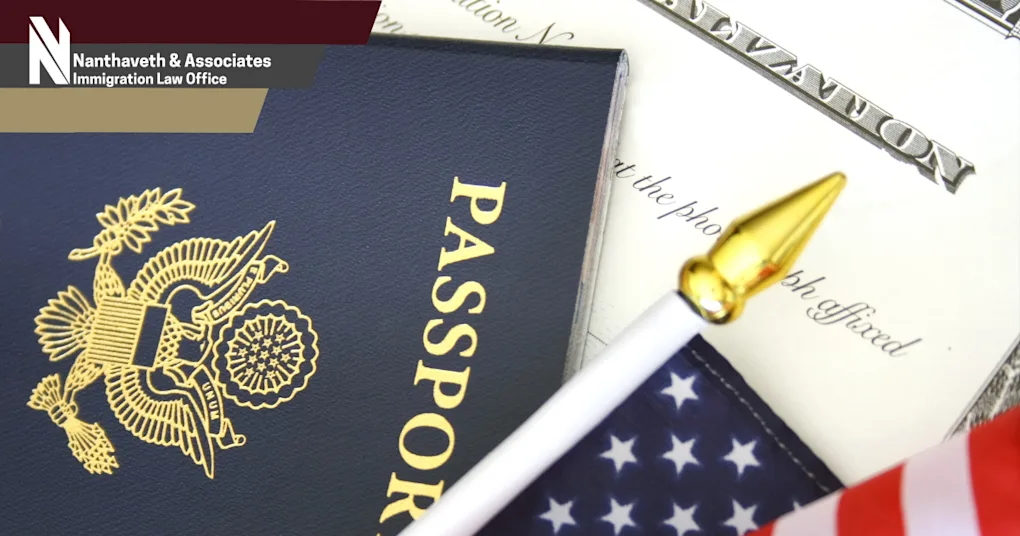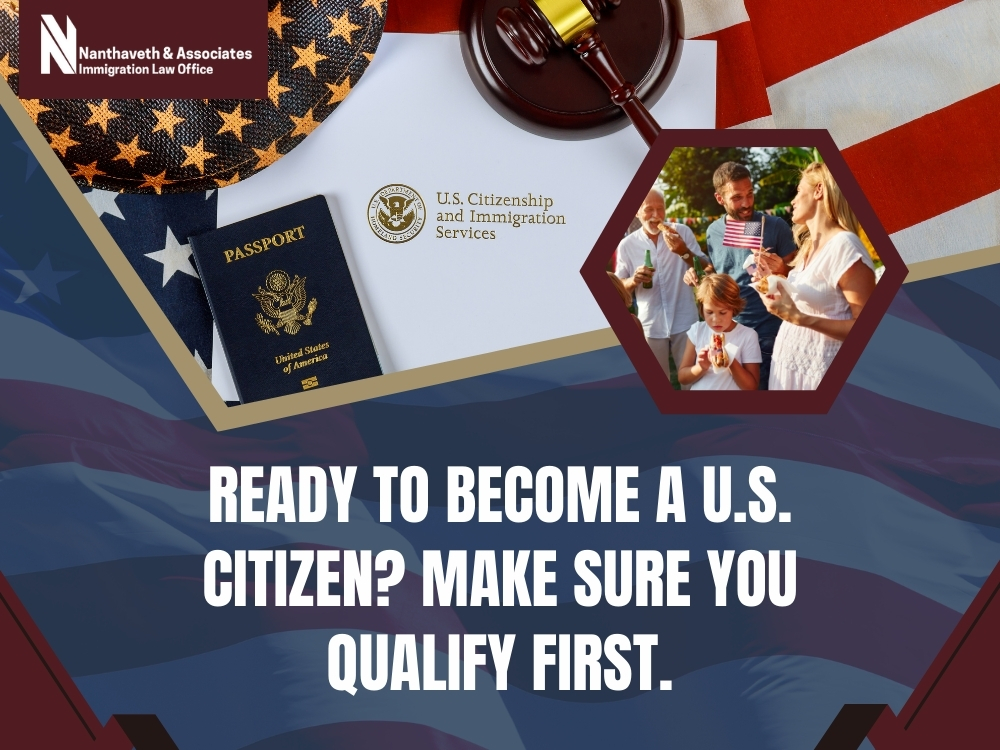Citizenship and Naturalization

If you’re like many people interested in becoming United States citizens, naturalization is the way to go – but where do you start? For some, the best path toward U.S. citizenship begins in an immigration attorney’s office. Working with an Austin immigration attorney is one way to ensure that you have someone to explain the process to you, fill out and file your forms, and help you do everything necessary to prepare for citizenship.
Citizenship and Naturalization: The Basics
Before you can apply for U.S. citizenship, you’ll need to make sure you’re eligible.
Your attorney can help you figure out whether you qualify – and whether you qualify for any exceptions or accommodations – before you create your petition.

3 Paths to Citizenship and Naturalization
There are three main paths to U.S. citizenship through naturalization if you weren’t born in the U.S. You can gain citizenship through:
- A child automatically acquires citizenship through his or her parents, provided that both parents are U.S. citizens.
- A child who has one U.S. citizen parent is automatically a citizen if he or she was born on or after November 14, 1986, and if the citizen parent was present in the U.S. (or its territories) for at least 5 years prior to the child’s birth (as long as two of those years were after the citizen parent’s 14th birthday).
- Additionally, a child with one U.S. citizen parent can acquire citizenship if he or she was born after October 10, 1952 but before November 14, 1986, if his or her citizen parent was in the U.S. for at least 10 years prior to the child’s birth (as long as five of those years were after the child’s 14th birthday).
- A child under the age of 18 whose parent naturalizes – as long as the child lives with the naturalized parent at the time – can derive U.S. citizenship automatically. This can only happen if the child is a legal green card holder, though.
- Naturalization is the process by which a person becomes a U.S. citizen when he or she was not born to citizen parents. This voluntary process requires applicants to be at least 18 years old and spend at least 5 years in the U.S. as a permanent resident (or 3 years if the person is married to a U.S. citizen). The permanent residency requirement can be waived if the person has served in the U.S. Armed Forces.
The Citizenship and Naturalization Process
Many people choose to apply for citizenship through naturalization with an attorney’s help. That’s because immigration lawyers are very familiar with changes (and proposed changes) in U.S. immigration law that can affect their clients – and because they’re extremely experienced in working through the immigration system.
In order to become a naturalized citizen of the United States, a person must follow these steps:
- Meet eligibility requirements
- Submit Form N-400
- Go to a biometrics appointment
- Complete the citizenship and naturalization interview
- Receive a decision from USCIS
- Take the Oath of Allegiance
Here’s a closer look at each.
#1. Meet Eligibility Requirements
In order to become a naturalized citizen, you must be at least 18 years old at the time you file your application. You must also be a permanent resident of the United States, and you must have had your green card (your lawful permanent resident status) for at least 5 years. You are eligible to become a citizen after only 3 years of lawful permanent residency if you are married to a U.S. citizen. You must show that you’ve lived for at least 3 months in the state (or USCIS district) where you apply, as well.
You must also:
- Show that you have been physically present in the U.S. for at least 30 months out of the 5 years before you file your application

- Be able to read, write and speak basic English
- Have a basic understanding of how the U.S. government works and American history (civics)
- Be a person of good moral character
- Demonstrate an attachment to the principles and ideals of the U.S. Constitution
#2. Submit Form N-400
If you’re eligible, you must fill out and file Form N-400, Application for Naturalization. Your attorney can do this for you. When you file Form N-400, you’ll also need to provide supporting documentation, such as:
- A copy of your green card
- A copy of your marriage certificate, if you’re married
- Form N-426, Request for Certification of Military or Naval Service, if you’re applying for citizenship based on your previous or current military service
- DD Form 214 or NGB Form 22 (or equivalent discharge orders) if you’re applying for citizenship based on previous military service in the U.S. Armed Forces
- A copy of your official military orders if you’re currently in any branch of the U.S. Armed Forces
- Evidence of your citizen spouse’s employment abroad if you are applying on that basis
- Two passport-style photographs
You may need additional documentation as well. You should talk to your immigration attorney if you aren’t sure what kind of documentation to provide.
#3. Go to a Biometrics Appointment
U.S. Customs and Immigration Services will mail you a notice that tells you when and where to show up for your biometrics appointment. Typically, a biometrics appointment takes less than 30 minutes to complete. During this part of the citizenship and naturalization process, a USCIS official will take your picture, collect your fingerprints for digital storage, and have you sign your name for digital storage, as well. You don’t need to study for anything before you go to your biometrics appointment – but you will need to study for your civics test, which USCIS will give you at your naturalization interview.
#4. Complete the Citizenship and Naturalization Interview
You’ll receive a notice in the mail from USCIS about your citizenship and naturalization interview. This interview shouldn’t take long – most people are finished within a half-hour – but it can take some time, particularly if the USCIS officer reviewing your file has additional questions or needs clarification on your application.
During your interview, the USCIS officer may ask you about your time in the United States or any of the information you included on your Form N-400. He or she might also ask you about your marriage in an effort to ensure that you didn’t marry just to gain an immigration benefit (which is a crime).
You’ll also take the citizenship test at your naturalization and citizenship interview. During this time, the USCIS officer assigned to your case will be evaluating your ability to speak English. He or she will also read a sentence aloud and ask you to write it in English.
The citizenship test can consist of up to 10 questions. Everyone receives different questions, but there’s a list of the questions an officer can ask you here. You can – and should – study for the civics test. You must answer at least six questions correctly. If you cannot answer six out of 10 questions correctly, you will not pass the test. Questions revolve around these subjects:
- Principles of American democracy
- The U.S. system of government
- Rights and responsibilities of U.S. citizens
- American history, including recent American history and other important historical information
- Geography
- S. symbols
- S. holidays
#5. Receive a Decision From USCIS
Often, you’ll receive a decision from USCIS on the same day you have your citizenship and naturalization interview. However, sometimes USCIS needs additional information to make a decision – and if that happens in your case, don’t worry. You’ll be given enough time to gather the information and submit it to USCIS, and then you’ll receive a notification of USCIS’s decision in the mail.
There are three possible outcomes of a citizenship application:
- If your petition is granted, you’re going to become a U.S. citizen after you take the Oath of Allegiance to the United States.
- If your petition is continued, it means the USCIS needs more information or you need to pass the civics test.
- If your petition is denied, you cannot become a U.S. citizen at this time. However, your immigration attorney may be able to help you appeal a denial.
#6. Take the Oath of Allegiance to the United States
If your naturalization petition is granted, you’ll receive notice about your Oath of Allegiance ceremony. You must attend the ceremony and take the Oath of Allegiance to the United States in order to receive the certificate that makes you a naturalized U.S. citizen.
Common Questions About Citizenship and Naturalization
- Who is eligible for citizenship?
- What rights and responsibilities do naturalized citizens have?
- What can I do if my petition is denied?
Here’s a closer look at each.
Who is Eligible for Citizenship?
In order to be eligible for U.S. citizenship through naturalization, you must:
- Be at least 18 years old at the time you apply for naturalization
- Be a permanent resident of the United States and have been issued a Permanent Resident Card (commonly called a green card)
- Have lived in the U.S. for at least 5 years preceding your application, or 3 years if you are married to a U.S. citizen, or possibly if you have served in the U.S. Armed Forces
- Be able to read, write and speak basic English
- Know the fundamentals of U.S. history, as well as the form and principles of the U.S. government
- Be a person of good moral character
You are not eligible for citizenship if you’ve been convicted of certain crimes, or if you ever deserted the U.S. Armed Forces.
What Rights and Responsibilities Do Naturalized Citizens Have?
Naturalized U.S. citizens have the same rights and responsibilities that natural-born U.S. citizens have. As a citizen, you must:
- Support and defend the U.S. Constitution
- Participate in the democratic process
- Respect and obey federal, state and local laws
- Respect the rights, beliefs and opinions of others
- Participate in your local community, and stay informed of the issues affecting your community
- Pay income and other taxes, honestly and on time, to the federal, state and local authorities
- Serve on a jury when you’re called upon
- Defend the country if necessary
You also have certain freedoms and rights, including:
- The freedom to express yourself
- The freedom to worship, or not worship, as you wish
- The right to vote in elections for public officials
- The right to a prompt, fair trial by jury
- The right to apply for federal employment that requires U.S. citizenship
- The right to run for elected office
- The freedom to pursue life, liberty and the pursuit of happiness
What Can I Do if My Citizenship Petition is Denied?
You may be able to appeal a denial of your U.S. citizenship petition. You should talk to your immigration attorney about your options if you receive a notice of denial.
Do I Qualify For Dual Citizenship
If you’re like many people, you’ve heard of dual citizenship – the act of being a citizen of two countries. The U.S. allows its citizens to maintain citizenship in another country, which entitles people who have dual citizenship to all the benefits that both countries offer.
Frequently Asked Questions
What is a green card, and who can get one?
A green card is a card issued by U.S. Citizenship and Immigration Services, or USCIS, that proves a person is a lawful permanent resident of the United States. A green card authorizes the person named on it to live and work anywhere in the U.S. Only people who are eligible for admission into the United States and have followed the appropriate channels can apply for lawful permanent residency.
What is USCIS?
USCIS is short for U.S. Citizenship and Immigration Services, which is part of the U.S. Department of Homeland Security. It’s the government agency that oversees immigration into the United States. It approves and denies green cards, work permits, travel permits and naturalization, as well as some other types of immigration benefits.
Are most green card applications approved?
Most green card applications are approved, but as many as 18 percent of them have been denied in recent years. If you receive an unfavorable immigration decision, such as the denial of a green card, you may be able to appeal your case or file a motion to have it reopened or reconsidered.
What is a lawful permanent resident, or LPR?
A lawful permanent resident is a person who legally resides in the United States without citizenship. LPRs are foreign nationals who are authorized to work or live anywhere in the U.S. or its territories, and who can sponsor some relatives to bring them to the United States. Lawful permanent residents can eventually apply for U.S. citizenship if they wish, but they do not have to do so.
What is a visa?
A visa is an authorization from the United States government that allows a person to enter the U.S. legally. Visas are only valid for a specific amount of time, and every visa’s expiration timeframe is different. You can get an immigrant visa, which means you intend to immigrate to the U.S., or a nonimmigrant visa that indicates you’re only staying temporarily.
What is the Visa Bulletin?
The Visa Bulletin is a document issued by the U.S. Department of State each month. It shows which green card applications can begin to move forward based on when they were originally filed. Only a certain number of green card applications can be issued in certain categories every year, which makes the Visa Bulletin necessary.
What are biometrics when it comes to immigration?
Biometrics are measurements of your identifying features. During a biometric screening for immigration purposes, a government official captures your fingerprints, takes your photo and gets a copy of your signature.
Will I have to attend an immigration interview?
Many people must attend an immigration interview to obtain a visa or green card. If you do have to attend an interview, your attorney will let you know. You should receive a notice in the mail that advises you on where to go and when to show up for your interview.
What is the citizenship test?
In order to become a naturalized citizen of the United States, you must take and pass the citizenship test. The official administering the test will ask you 20 of 128 possible civics-related questions, and you must answer at least 12 of them correctly. You will also be evaluated on your ability to speak, read and write in English. If you don’t pass the test, you can be retested on the portion of the test you failed (English or civics) between 60 and 90 days from your initial interview.
What is the Public Charge Rule?
The Public Charge Rule is a ruling from the U.S. Department of Homeland Security that requires immigrants to be unlikely to become dependent on social services and public programs (such as financial aid from the government).
Do You Need to Talk to a Lawyer About Citizenship and Naturalization?
If you’re considering becoming a U.S. citizen through naturalization, we may be able to help you. Call us or contact us online to schedule your consultation today.


11211 Taylor Draper Lane Suite 107
Austin, TX 78759
Tel: (512) 828-3791
Hours: 8:00 AM - 6:00 PM
Payment: all major credit cards, cash, check, money orders, cashiers check
Directions To Our Office
Areas Of Service
Copyright © 2025 | Nanthaveth & Associates | Immigration Law Firm Marketing Specialist MarketCrest
Not all consultations are free, and they are not all conducted by Vi Nanthaveth.
